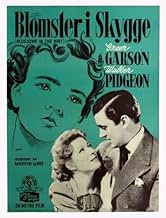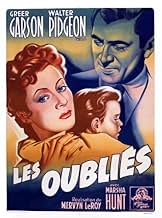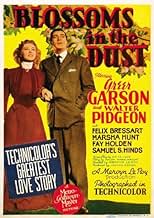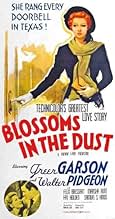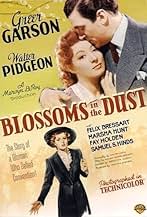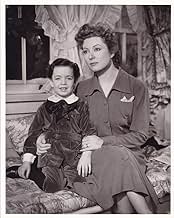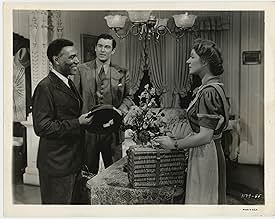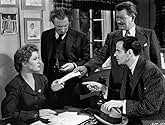AVALIAÇÃO DA IMDb
6,9/10
2,5 mil
SUA AVALIAÇÃO
Adicionar um enredo no seu idiomaAfter losing her young son, Edna Gladney opposes the unfair laws discriminating against children whose parents are unknown, and opens an orphanage for those children.After losing her young son, Edna Gladney opposes the unfair laws discriminating against children whose parents are unknown, and opens an orphanage for those children.After losing her young son, Edna Gladney opposes the unfair laws discriminating against children whose parents are unknown, and opens an orphanage for those children.
- Direção
- Roteiristas
- Artistas
- Ganhou 1 Oscar
- 3 vitórias e 4 indicações no total
Charles Arnt
- G. Harrington Hedger
- (as Charlie Arnt)
Patricia Barker
- Tony
- (as Pat Barker)
Avaliações em destaque
This is a wonderful, heart warming, fantastic movie to see. Greer Garson is splendid in this movie, and it will really touch your heart. This movie has a special meaning for me, as I was adopted from the famous Edna Gladney Home in Ft. Worth, Texas. Edna Gladney personally handed me to my new adoptive parents. She called them that morning and told them she had the most beautiful baby girl ready for them to bring home. I have watched this movie so many times, and wow, what a movie! Just love Greer Garson, she is a splendid and talented actress. One more note, if it hadn't been for Edna Gladney and her crusade, I most likely would have been an orphan. She did a lot for unwanted babies.
"Blossoms in the Dust" is a biographical message movie about the plight of illegitimate children in the early 20th century and the stigma they faced from the get go because of the sins of their parents.
This film might as well have been called "The Greer Garson Show," because it is all about her. She plays Edna Gladney, a woman who made a crusade of finding loving adoptive homes for outcasts. She's lovely and committed in the role, and earned a Best Actress Oscar nomination for it. I believe this was the first time she was paired with Walter Pidgeon, and he's pretty good too as a cocky Texan who charms her and then marries her, but he very definitely stands in Garson's shadow for most of the film.
Cedric Gibbons, Urie McCleary, and Edwin B. Willis won the Oscar for their color art direction, and this is one of the rare films from the early days of Technicolor that looks gorgeous rather than garish. The film was also nominated for Best Picture and Best Color Cinematography.
Grade: B+
This film might as well have been called "The Greer Garson Show," because it is all about her. She plays Edna Gladney, a woman who made a crusade of finding loving adoptive homes for outcasts. She's lovely and committed in the role, and earned a Best Actress Oscar nomination for it. I believe this was the first time she was paired with Walter Pidgeon, and he's pretty good too as a cocky Texan who charms her and then marries her, but he very definitely stands in Garson's shadow for most of the film.
Cedric Gibbons, Urie McCleary, and Edwin B. Willis won the Oscar for their color art direction, and this is one of the rare films from the early days of Technicolor that looks gorgeous rather than garish. The film was also nominated for Best Picture and Best Color Cinematography.
Grade: B+
A good film for a Sunday afternoon, or any other time if you're busy on Sunday.
None of the scenes are dragged out, even the death scenes are treated briefly. Nothing is going to get in the way of the narrative, beginning with a woman overcoming bereavement by taking in the unwanted children an orphans of Texas.
The film then goes on the challenge the very language we use when it comes to these children, with Edna Gladney rejecting the words 'orphan' and 'illegitimate'.
'There are no illegitimate children, only illegitimate parents', she boldly announces to the Texan senate.
And so Gladney's local endeavour becomes a political, state-wide one, and though she never falters in her moral drive, her initial loss is evoked once again in the most cherished of her foundlings.
Fast-paced, fade-outs and an all round good story.
None of the scenes are dragged out, even the death scenes are treated briefly. Nothing is going to get in the way of the narrative, beginning with a woman overcoming bereavement by taking in the unwanted children an orphans of Texas.
The film then goes on the challenge the very language we use when it comes to these children, with Edna Gladney rejecting the words 'orphan' and 'illegitimate'.
'There are no illegitimate children, only illegitimate parents', she boldly announces to the Texan senate.
And so Gladney's local endeavour becomes a political, state-wide one, and though she never falters in her moral drive, her initial loss is evoked once again in the most cherished of her foundlings.
Fast-paced, fade-outs and an all round good story.
I found this to be a fast-moving, compassionate (supposedly) true-life story of a woman who helped babies get homes to live in while fighting to have the word "illegitimate" stricken from all record books since it was unfairly penalizing the children.
The three lead actors in the film - Greer Garson, Walter Pigeon and Felix Bressart - are all fun to watch. Garson gives a great speech to Congress near the end of the movie. It's also a nice color film, something that wasn't made much in 1941.
Story-wise, the early tragedies are not dwelled on in here. In fact, they come and go quickly and that's nice because it makes this more of an upbeat movie with a positive message. That's the intent, so why dwell on the negatives?
The only negatives, in my opinion were too much usage of the word "darling," to the point where it's annoying, and the last scene is drawn out a bit too much. But, overall, it's a very powerful movie and guaranteed to bring tears to anyone's eyes. It should appeal to most people. I would like to see this put on a DVD.
The three lead actors in the film - Greer Garson, Walter Pigeon and Felix Bressart - are all fun to watch. Garson gives a great speech to Congress near the end of the movie. It's also a nice color film, something that wasn't made much in 1941.
Story-wise, the early tragedies are not dwelled on in here. In fact, they come and go quickly and that's nice because it makes this more of an upbeat movie with a positive message. That's the intent, so why dwell on the negatives?
The only negatives, in my opinion were too much usage of the word "darling," to the point where it's annoying, and the last scene is drawn out a bit too much. But, overall, it's a very powerful movie and guaranteed to bring tears to anyone's eyes. It should appeal to most people. I would like to see this put on a DVD.
"There are no illegitimate children, only illegitimate parents" what a great line. Greer Garson is wonderful in this movie. She really does a great job portraying Edna Gladney. Living in Fort Worth, were Edna Gladney's home is still in operation, and working in the Court house, this movie really made an impact on me. I have seen old adoption records actually signed by Edna Gladney. What a wonderful lady - she changed the world! What a wonderful movie - get it and watch it, you'll love it!
Você sabia?
- CuriosidadesThe child who portrayed Tony in the movie was a 4-year-old named Pat Barker. It was only when Pat came to Fort Worth to celebrate the movie's premiere that the world discovered Pat was really Patricia.
- Erros de gravaçãoSam and Edna celebrated their first anniversary in 1907, which means they married in 1906. But early in the film - when both are still single - they danced to "Let Me Call You Sweetheart", which was not published until 1910.
- Cenas durante ou pós-créditosOpening credits prologue: This is the story of a great woman, and of the great work she is doing for humanity. Her name is Edna Gladney, and she lives in Fort Worth, Texas. We dedicate this picture to her. Let us first take you back to a certain household in Wisconsin at the beginning of the century -
- ConexõesFeatured in MGM/UA Home Video Laserdisc Sampler (1990)
- Trilhas sonorasLullaby
(uncredited)
Music and Lyrics by Herbert Stothart and Earl K. Brent
Sung by Nadine Conner and Irene Crane in opening credits
Principais escolhas
Faça login para avaliar e ver a lista de recomendações personalizadas
- How long is Blossoms in the Dust?Fornecido pela Alexa
Detalhes
- Data de lançamento
- País de origem
- Idioma
- Também conhecido como
- De corazón a corazón
- Locações de filme
- Empresas de produção
- Consulte mais créditos da empresa na IMDbPro
- Tempo de duração1 hora 39 minutos
- Proporção
- 1.37 : 1
Contribua para esta página
Sugerir uma alteração ou adicionar conteúdo ausente

Principal brecha
By what name was Flores do Pó (1941) officially released in India in English?
Responda

